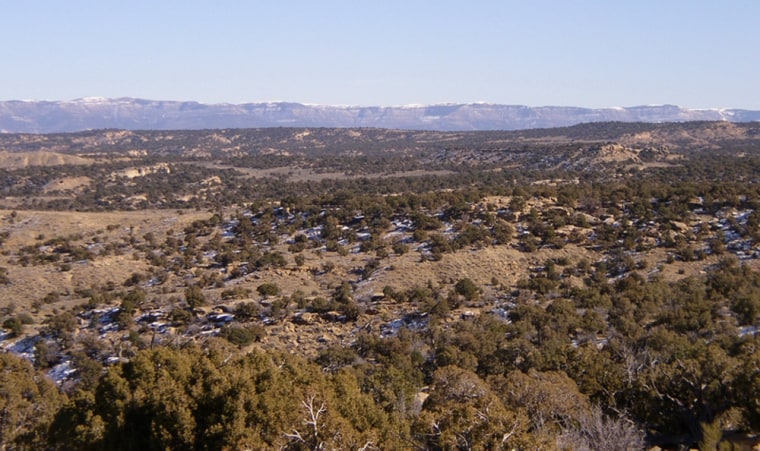The Bush administration's push Tuesday to speed up development of oil shale in the Rocky Mountains runs headlong into Colorado and Wyoming leaders, who say the environmental costs are too high and the technology unproven.
The Interior Department unveiled proposed regulations Tuesday for a program to sell oil shale leases on federal lands, similar to the leases sold now for oil and natural gas both on and offshore.
The move comes after Sen. Ken Salazar, D-Colo., last year inserted language into a spending bill that bars the federal government from issuing final rules for commercial oil-shale development.
Today's "announcement does not change the realities," said Matt Lee-Ashley, a spokesman for Salazar. "While the administration can finalize its draft rules, it is premature to move forward with a full commercial leasing program."
Bureau of Land Management spokesman Matt Spangler said Tuesday's proposal does not conflict with Salazar's provision.
President Bush, in an energy speech last month, called for lifting restrictions on oil shale leasing in the Green River Basin of Colorado, Utah and Wyoming.
"For many years, the high cost of extracting oil from shale exceeded the benefit. But today the calculus is changing," Bush said.
"Companies have invested in technology to make oil shale production more affordable and efficient. And while the cost of extracting oil from shale is still more than the cost of traditional production, it is also less than the current market price of oil. This makes oil shale a highly promising resource," he said.
Salazar responded by saying that "the reality about oil shale (is that) it's hydrocarbons locked up in rock and it is very difficult to extract."
Moratorium could expire in October
Bush said Democrats in Congress "slipped" a moratorium on larger oil shale works into a spending bill last year. The provision, which will expire in October unless Congress renews it, stopped the government from authorizing a commercial leasing program.
"It is absurd to claim my amendment was just 'inserted' into an appropriations bill or that it is the main obstacle to oil shale development," responded Rep. Mark Udall, D-Colo., who joined Salazar in inserting the amendment.
"The obstacles are the same ones that have been there for a century — the lack of technology for developing oil shale in an economically realistic way," he said.
Wyoming Gov. Dave Freudenthal, a Democrat, also was skeptical.
"The Bush administration has pushed for oil shale since the beginning, even though the private sector has said since the beginning, 'Now just a minute, we're a long way from being ready,'" Freudenthal said.
"What they should be doing is pushing funding for the development of the technology. And these questions about leasing can follow the development of technology, instead of 'Let's lease first while we've got a political climate.'"
Oil shale enjoyed a fleeting promise during the 1970s when oil prices skyrocketed, but was abandoned by the early 1980s when prices dropped and Exxon shut down major operations in western Colorado.
"We must not sacrifice Colorado in a knee-jerk reaction to decades of failed energy policy," Gov. Bill Ritter said in a statement.
"No one — not even the companies working on oil shale development — can tell us with any certainty how much energy it will take to develop this resource, where that energy would come from, what the impacts on Colorado's water supplies or quality would be, and what housing, transportation and other infrastructure needs will be," he said.
Companies want certainty
But in Utah, a developer says his company already has the technology to produce 4,000 barrels a day using a furnace that can heat up rock using its own fuel.
"This is not a science project," said Daniel Elcan, managing director of Oil Shale Exploration Corp., an industry player in demonstration efforts.
Elcan said Oil Shale Exploration Corp. is ready to go, and that the whole industry was being held back by Congress. Companies need certainty on whether and how they will be allowed to work larger tracts of federal land, he said.
Sen. Orrin Hatch, R-Utah, said the country has to do everything it can to boost energy production.
"We have as much oil in oil shale in Utah, Wyoming and Colorado as the rest of the world combined," he said.
Shell Exploration & Production Co. is working on its own lands in western Colorado but has permission to work three 160-acre parcels of federal land on an experimental basis. It wants the federal government to set a firm date when development of larger and more productive oil shale fields will be allowed. Shell says it needs the certainty to pace its capital and research investments.
"Oil prices do not drive the pace of our research and development. Instead, Shell continues a cautious, steady approach," said Darci Sinclair, a Shell Oil Co. spokesman in Houston.
"While we are interested in reaching commercial development as soon as feasible, it must be done in a way that is economically viable, environmentally responsible and socially sustainable," she said.
Shell is working to melt oil out of rock by heating up the ground using oven-like elements. The company says it's about two years away from proving it can accomplish this without polluting groundwater.
Environmental groups have been watching Shell's experiment with interest, but they doubt oil shale will solve anything.
"Today's high gasoline prices are the result of a host of economic conditions that have little to do with how much drilling is or is not taking place on federal lands," said David Alberswerth, an energy policy adviser for the Wilderness Society. He said the weak dollar, market speculation and demand in China and India are making oil more expensive.
